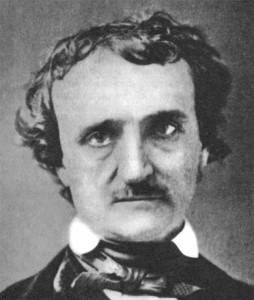When Words Were Scary…
There was a time when the most popular way to scare your closest friends and family was through relatively simple and straightforward stories. Well before Halloween became all about dressing up your dog like a cat or a bumblebee or Ron Paul (depending on the breed), All Hallow’s Eve was a time for sitting around and telling tales of the dead. Ghost stories were also the most traditional way to spend Christmas Eve, particularly in Victorian England (“A Christmas Carol,” anyone?).
But over time, good, old-fashioned ghost stories have lost some of their ability to spook. While many of you reading this might prefer a fireside reading of Edgar Allen Poe, most Americans will be off at Paranormal Activity 3.
But aside from all the additional competition and our ever-shrinking attention spans, it seems that words themselves—certain words that used to chill, frighten, horrify, spook, and plenty of other synonyms for scares—have lost their power to petrify.
For example: creepy. When it first joined the language in 1831, this adjective referred to “the sensation of the flesh creeping in horror.” But it no longer creeps out too many people, particularly the members of Generation Text. As University of Pennsylvania linguistics professor Mark Liberman observed on his blog, Language Log, teenagers are using the expression “That’s so creepy…” to qualify coincidental or unexpected bits of news, as in “You were there, too? That’s so creepy!” or “Isn’t it creepy how she called at the last minute?” In a subsequent post, Liberman charted the similar taming of other formerly scary words, including:
- Terrific. From the Latin terrificus (“causing terror or fear”). In 1667 terrific meant “dreadful” or “frightful.” By 1809 it was beginning to take on its current meaning, “really excellent.”
- Awesome. From “awe,” an Old English word that signified “dread mixed with veneration”–the feeling a mere mortal experienced in the presence of the gods, or God. Today it’s, like, omigod.
- Uncanny. From Scots “canny,” meaning “knowing.” Uncanny originally meant “unknowable” or “associated with the supernatural.” Nowadays any better-than-average skill is called “uncanny,” as in “an uncanny sense of timing.”
Picking up where he left off, word blogger Nancy Friedman published the results of her own investigation:
- Weird. From Old English “wyrd,” meaning “fate” or “destiny,” weird once meant “supernatural in origin,” as in the Weird Sisters (aka witches) in Macbeth. Now it’s creepy‘s twin: strange, odd, or even funny-ha-ha.
- Wonderful. It originally meant, yes, “full of wonder,” back when “wonder” meant “a cause of astonishment or admiration.” Wonderful meant “miraculous,” not “super, fantastic, I’ll have my people call your people.”
- Formidable. From Latin formido–“terror”–formidable meant “causing fear, dread, or apprehension.” Current meaning: “pretty darned impressive.” (In French, formidable has many more shades of meaning, depending on inflection and subtle shift of emphasis. I remember spending a couple of hours in the language lab repeating “Formidable…formiDABle!…FORmidable” to approximate minute nuances of meaning translating to “swell,” “dreadful,” “over-the-top,” and so on.)
- Tremendous. From Latin tremendus (literally, “to be trembled at”), tremendous in English used to mean “awful, dreadful.” By 1812 it had come to mean “Immense” or “extraordinarily great.” (Meanwhile, “awfully” was being paired with “good.”).
As Friedman points out, even the very notion of being “afraid” has lamed out: “All we hear is ‘I’m afraid…I’m going to have to ask you to work late.’”
This is not to say that we are necessarily using words improperly* when we say something like, “Boy, that herb garden of yours has tremendous potential, Harold.” Words are meant to be used, and their definitions evolve accordingly. But we should nonetheless be aware of the historical capacity and, well, tremendous potential of the words we use.
*Though sometimes we do. One personal pet peeve: describing something funny as “hysterical.” That’s just wrong—hysterical means driven to or prone to hysterics, so there’s no such thing as a hysterical joke or a hysterical movie (though either could drive one to hysterical laughter). And yes, the term’s now common usage as meaning “extremely humorous” has made its way into the dictionary. But just because it’s in the dictionary doesn’t mean it’s correct.
So tomorrow night, if some kid, perhaps dressed as a vampire or a pirate or Mitt Romney, comes to your door and yells “Trick or Treat!” hold him to his word: Ask for a trick.



